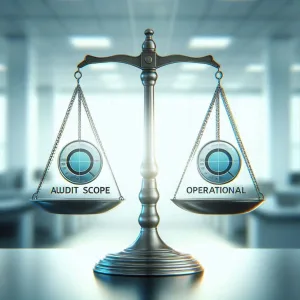Auditor insurance, often referred to as professional liability insurance or errors and omissions insurance, is a specialized coverage designed to protect auditors against claims of negligence, errors, or omissions that may arise during the performance of their professional duties. This type of insurance is particularly crucial for internal audit functions, as it provides a safety net against potential financial losses and reputational damage that can occur from audit-related activities.
Importance of Auditor Insurance for Internal Audit Functions
The significance of auditor insurance cannot be overstated, especially in the context of internal audit functions. Here are several reasons why it is essential:
- Protection Against Claims: Internal auditors are responsible for evaluating and improving the effectiveness of risk management, control, and governance processes. If an organization faces a claim due to perceived negligence in these areas, auditor insurance can cover legal fees and settlements, thereby safeguarding the financial health of the audit department and the organization as a whole.
- Enhancing Credibility: Having auditor insurance can enhance the credibility of the internal audit function. It demonstrates a commitment to professionalism and accountability, which can foster trust among stakeholders, including management and the board of directors.
- Compliance with Regulatory Standards: As regulatory environments become increasingly complex, having adequate insurance coverage helps ensure that internal audit functions comply with industry standards and regulations. This compliance is vital for maintaining operational integrity and avoiding penalties.
Overview of Risks Faced by Internal Auditors
Internal auditors encounter various risks that can impact their work and the organizations they serve. Understanding these risks is crucial for selecting the appropriate auditor insurance policy. Key risks include:
- Errors and Omissions: Mistakes in judgment or oversight during audits can lead to significant financial repercussions for the organization. Auditor insurance provides coverage for claims arising from such errors.
- Fraud and Misrepresentation: Internal auditors may uncover fraudulent activities or misrepresentations within the organization. If stakeholders believe that the auditors failed to identify these issues, they may pursue legal action, making insurance coverage essential.
- Regulatory Compliance Failures: Non-compliance with laws and regulations can result in severe penalties. Internal auditors play a critical role in ensuring compliance, and insurance can protect against claims related to compliance failures.
- Reputational Damage: The reputation of the internal audit function is vital for its effectiveness. Any claims or legal actions can tarnish this reputation, and auditor insurance can help mitigate the financial impact of such situations.
Auditor insurance is a critical component of risk management for internal audit functions. It not only protects against potential claims but also enhances the credibility and compliance of the audit process. Understanding the risks faced by internal auditors is essential for selecting the right insurance policy tailored to their specific needs.
Understanding the Types of Auditor Insurance
When it comes to safeguarding the interests of internal audit functions, selecting the right auditor insurance policy is crucial. Various types of insurance policies cater to the unique risks faced by auditors and understanding these can help internal audit managers and financial officers make informed decisions. Below are the key types of auditor insurance relevant to internal audit functions:
- Professional Liability Insurance (Errors and Omissions Insurance): This type of insurance protects auditors against claims of negligence, errors, or omissions in the performance of their professional duties. It is essential for auditors as it covers legal costs and damages arising from claims made by clients or third parties due to perceived failures in service delivery. This insurance is particularly important in the context of internal audits, where the accuracy and reliability of findings are paramount [5].
- General Liability Insurance: This policy provides coverage for claims related to bodily injury, property damage, and personal injury that may occur during the course of business operations. For internal auditors, this insurance is vital as it protects against incidents that could arise from office visits or interactions with clients, ensuring that the organization is shielded from potential lawsuits [10].
- Cyber Liability Insurance: Given the increasing reliance on technology and the internet, cyber liability insurance has become essential for auditors. This coverage protects against data breaches, cyberattacks, and other technology-related risks that could compromise sensitive audit information. As internal auditors often handle confidential data, having this insurance can mitigate the financial impact of cyber incidents.
- Directors and Officers (D&O) Insurance: This insurance protects the personal assets of directors and officers in the event they are sued for alleged wrongful acts while managing the organization. For internal audit functions, D&O insurance is crucial as it provides coverage for claims related to mismanagement, breaches of fiduciary duty, or failure to comply with regulations, which can arise from audit findings or recommendations.
Comparison of Coverages and When Each Type is Necessary
When selecting auditor insurance, it is important to compare the coverages offered by each type of policy and understand when each is necessary:
- Professional Liability Insurance is essential for all auditors, as it directly addresses the risks associated with providing professional services.
- General Liability Insurance is necessary for organizations that interact with clients or the public, providing a safety net against physical incidents.
- Cyber Liability Insurance is increasingly important in today’s digital landscape, especially for auditors handling sensitive information electronically.
- D&O Insurance is critical for organizations with a board of directors, as it protects leadership from personal liability arising from their decisions.
By understanding these types of auditor insurance and their specific coverage, internal audit managers and financial officers can tailor their insurance policies to effectively mitigate risks and protect their organizations. This strategic approach not only enhances the resilience of the internal audit function but also builds trust with stakeholders by ensuring compliance and accountability in audit practices.
Assessing Your Internal Audit Needs
When selecting the right auditor insurance policy, it is crucial for internal audit managers and financial officers to thoroughly assess their organization’s specific needs. This evaluation will help ensure that the chosen policy effectively covers the unique risks associated with internal audit functions. Here are some key points to consider:
- Identifying the Scope and Nature of Internal Audit Activities: Begin by clearly defining the scope of your internal audit activities. This includes understanding the types of audits conducted, such as compliance, operational, or financial audits. Each type may carry different risks and liabilities, which should be reflected in the insurance coverage. For instance, audits that involve sensitive financial data may require more comprehensive coverage to protect against potential breaches or errors.
- Evaluating the Size and Complexity of the Organization: The size and complexity of your organization play a significant role in determining your insurance needs. Larger organizations with multiple departments and intricate operations may face more significant risks, necessitating a more robust insurance policy. Conversely, smaller organizations may have different risk profiles and could benefit from tailored coverage that addresses their specific challenges without unnecessary costs.
- Considering Regulatory Requirements and Industry Standards: It is essential to stay informed about the regulatory landscape and industry standards that govern internal audits. Different sectors may have specific requirements for auditor insurance, and compliance with these regulations is critical. Understanding these requirements will help you select a policy that not only meets your organization’s needs but also adheres to legal obligations, thereby minimizing the risk of penalties or legal issues.
- Understanding Potential Liabilities Associated with Internal Audits: Internal audits can expose organizations to various liabilities, including errors, omissions, or negligence in the audit process. It is vital to assess the potential risks your internal audit function may encounter and ensure that your insurance policy provides adequate coverage for these liabilities. This may include coverage for legal defense costs, settlements, and damages arising from audit-related claims.
By carefully evaluating these factors, internal audit managers and financial officers can make informed decisions when selecting auditor insurance policies that align with their organization’s specific needs and risks. This proactive approach not only safeguards the organization but also enhances the credibility and effectiveness of the internal audit function.
Key Factors to Consider When Selecting an Auditor Insurance Policy
When it comes to selecting an auditor insurance policy, internal audit managers and financial officers must navigate a complex landscape to ensure they choose a policy that effectively meets their needs. Here are the critical elements to consider during the decision-making process:
- Coverage Limits and Deductibles: It is essential to evaluate the coverage limits offered by the insurance policy. These limits should align with the potential risks faced by the internal audit function. Additionally, understanding the deductibles is crucial, as higher deductibles may lower premium costs but could lead to significant out-of-pocket expenses in the event of a claim. Balancing coverage limits with manageable deductibles is key to effective risk management.
- Exclusions and Limitations of the Policy: Every insurance policy comes with specific exclusions and limitations that can significantly impact the level of protection provided. It is vital to thoroughly review these exclusions to understand what is not covered. This knowledge will help internal audit functions avoid unexpected gaps in coverage that could leave them vulnerable during audits or investigations.
- Reputation and Financial Stability of the Insurance Provider: The reputation and financial stability of the insurance provider are paramount. A provider with a strong track record in the industry is more likely to deliver reliable service and support when needed. Researching the provider’s history, customer reviews, and financial ratings can provide insights into their reliability and ability to fulfill claims.
- Customer Service and Claims Support: The quality of customer service and claims support offered by the insurance provider can greatly influence the overall experience. A responsive and knowledgeable support team can make a significant difference during stressful situations, such as filing a claim. Assessing the provider’s customer service reputation and their claims process can help ensure that internal audit functions receive the assistance they need promptly.
- Cost vs. Value of the Insurance Policy: While cost is an important factor, it should not be the sole determinant in selecting an auditor insurance policy. It is crucial to evaluate the value provided by the policy in relation to its cost. A lower premium may come with inadequate coverage or poor service, which could ultimately lead to higher costs in the long run. Therefore, internal audit managers should consider the overall value of the policy, including coverage, service quality, and the provider’s reputation, to make an informed decision.
By carefully considering these key factors, internal audit managers and financial officers can select an auditor insurance policy that not only protects their organization but also supports the integrity and effectiveness of their internal audit functions.
Evaluating Insurance Providers
When it comes to selecting the right auditor insurance policy, internal audit managers and financial officers must take a strategic approach to evaluate potential insurance providers. Here are some best practices to guide you through this process:
- Researching Potential Insurance Providers: Start by compiling a list of insurance providers that specialize in auditor insurance. Look for companies that have a strong track record in the industry and offer policies specifically designed for internal audit functions. This targeted research will help ensure that the providers you consider understand the unique risks and requirements associated with auditing.
- Reading Customer Reviews and Testimonials: Customer feedback can provide valuable insights into the reliability and quality of service offered by insurance providers. Look for reviews on independent platforms and industry forums to gauge the experiences of other internal audit professionals. Pay attention to comments regarding claims processing, customer service, and overall satisfaction with the policy coverage.
- Checking Financial Ratings and Industry Reputation: It is crucial to assess the financial stability of potential insurance providers. Check their ratings from reputable agencies such as A.M. Best, Moody’s, or Standard & Poor’s. A strong financial rating indicates that the provider is capable of meeting its obligations, which is essential for your peace of mind. Additionally, consider the provider’s reputation within the industry; a well-regarded company is more likely to offer reliable service and support.
- Engaging in Discussions with Providers About Specific Needs: Once you have narrowed down your options, initiate discussions with the insurance providers. This is an opportunity to communicate your specific needs and concerns regarding auditor insurance. Ask about their coverage options, exclusions, and any additional services they may offer, such as risk management resources or claims support. Engaging in these conversations will help you assess how well the provider understands your requirements and whether they can tailor their offerings to meet your needs.
By following these best practices, internal audit managers and financial officers can make informed decisions when selecting an auditor insurance policy that aligns with their organization’s needs and risk profile.
Common Mistakes to Avoid in Selecting Auditor Insurance
When it comes to selecting the right auditor insurance policy, internal audit managers and financial officers must navigate a complex landscape. Here are some common pitfalls to avoid during the selection process:
- Overlooking Specific Coverage Needs: One of the most significant mistakes is failing to identify and address the specific coverage requirements of your internal audit function. Each organization has unique risks and operational nuances that should be reflected in the insurance policy. It is crucial to thoroughly assess the potential liabilities and ensure that the policy covers all relevant aspects, including errors and omissions, professional liability, and any specific regulatory requirements that may apply to your industry [5].
- Focusing Solely on Price Rather Than Value: While budget constraints are a reality for many organizations, prioritizing cost over the value of coverage can lead to inadequate protection. A cheaper policy may not provide the necessary coverage or support in the event of a claim. It is essential to evaluate the overall value of the policy, including the extent of coverage, the insurer’s reputation, and the quality of customer service. A comprehensive policy that meets your needs may be more cost-effective in the long run, even if the upfront cost is higher [8].
- Failing to Review the Policy Regularly: Insurance needs can change over time due to shifts in business operations, regulatory changes, or evolving risks. Neglecting to review and update the auditor insurance policy regularly can leave an organization exposed to unanticipated liabilities. Internal audit managers should schedule periodic reviews of their insurance coverage to ensure it remains aligned with current operational realities and risk profiles [4].
- Neglecting to Seek Expert Advice or Consultation: Many internal audit managers and financial officers may feel confident in their ability to select an insurance policy without external input. However, this can be a costly oversight. Engaging with insurance brokers or consultants who specialize in auditor insurance can provide valuable insights and help identify potential gaps in coverage. Expert advice can also assist in navigating complex policy language and ensuring that the selected policy adequately protects the organization [6].
By being aware of these common mistakes, internal audit managers and financial officers can make more informed decisions when selecting auditor insurance, ultimately safeguarding their organizations against potential risks and liabilities.
Conclusion and Next Steps
Selecting the right auditor insurance policy is a critical decision that can significantly impact the effectiveness and resilience of an internal audit function. The right coverage not only protects against potential liabilities but also enhances the credibility and trustworthiness of the audit process. Here are the key takeaways to consider:
- Importance of Selection: Choosing the appropriate auditor insurance is essential for safeguarding your organization against risks associated with audit activities. A well-structured policy can provide peace of mind, ensuring that your internal audit team can operate effectively without the looming threat of financial repercussions from unforeseen events or claims.
- Assess Internal Audit Needs: It is crucial for internal audit managers and financial officers to conduct a thorough assessment of their specific needs. This involves understanding the unique risks associated with your organization’s operations and the potential liabilities that may arise from audit activities. Tailoring your insurance policy to these needs will ensure comprehensive coverage and protection.
- Research Options: Take the time to research various insurance options available in the market. Compare different policies, coverage limits, and exclusions to find the best fit for your internal audit function. Engaging with multiple insurance providers can provide insights into the most suitable options tailored to your organization’s requirements.
- Engage with Insurance Providers: Proactively reach out to insurance providers to discuss your needs and seek expert guidance. Insurance professionals can offer valuable advice on the nuances of auditor insurance, helping you navigate the complexities of policy selection. Their expertise can assist in identifying potential gaps in coverage and ensuring that your policy aligns with industry best practices.
In conclusion, the selection of auditor insurance is not merely a regulatory requirement but a strategic decision that can enhance the overall effectiveness of your internal audit function. By assessing your needs, researching options, and engaging with experts, you can make informed choices that will protect your organization and support its long-term success. Take the next step today to secure the right auditor insurance policy for your internal audit team.
Find out more about Shaun Stoltz https://www.shaunstoltz.com/about/
This post was written by an AI and reviewed/edited by a human.



